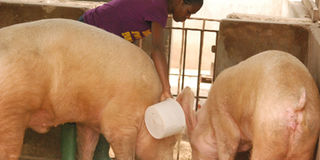Camborough Pigs: A breed that is worth the cost

Dr Naluyima tends to her Camborough pigs: Compared to other local breeds , they are a quality breed that feed a lot but grow fast and yield a large litter of piglets. Photo by Edgar R. Batte.
What you need to know:
Camborough pigs are not native to Uganda and one costs about Shs10m to import. But its productivity makes it worth the hassle.
Dr Emma Naluyima is a wealthy woman, though she may be modest about it, but wealthy nevertheless. This realisation takes time to sink in until you see her beautifully constructed house which sits on a large well-manicured compound. You may find yourself thinking how she got there. She is a veterinary surgeon and a farmer, with a particular business interest in Camborough pigs. She imports these boars at $4,000 (Shs10m) each that the realisation finally sunk in.
The breed
Naturally, the question is what she was thinking importing pigs at such ridiculous prices. “It is mainly because I cannot find them anywhere in the country. They used to be imported by the government but the project ended,’’ she says, with a calmness that made it seem as if one US dollar was worth two Uganda shillings.
“I have an aversion to in-breeding, and so should every farmer. It really dilutes the quality of the breed which can cause all sorts of problems,” she explains.
But what are these qualities that warrant the importation of a pig at such a price. “Camborough pigs are unlike any in Uganda right now. To start with, they grow really fast. At four months, the boars have attained a weight of 120kgs. They have considerably less fat, and the sows are great mothers. They don’t lose their babies, they feed the babies well and they have enough milk. They give birth to an average of 14 piglets and that’s three times a year. They are also resistant to diseases, but that is with good management,” she elaborates.
Challenges
Inspite of the fact, she may be very knowledgeable in this field—Dr Naluyima holds a Master’s degree in health sciences, not forgetting that she is a veterinary surgeon—she also encounters some difficulties; the major one being the cost of the feed. “They mainly feed on maize bran mixed with mukene, cotton cake, red salt and shells, which depending on the season, can be terribly expensive. Pigs literally cannot stop eating,’’ she says. “Of course, pigs being pigs, they will eat anything, but if you want maximal weight gain, as you should, maize bran is a must.”
The other are diseases, particularly swine fever. “Swine fever is the worst thing that can happen to you. It has no cure, it has no vaccine, and if you are unlucky, it will wipe out your entire stock. It happened to me once,” she says.
Prevention is the only way to avoid swine fever, and this requires constant vigilance. “Fence off your farm. You shouldn’t let just anyone enter your farm. If they must, they should wear protective gear, and their boots must be disinfected’’ Dr Naluyima advises. Other diseases were manageable as long the pigs were well-fed and the premises kept clean at all times.
Benefits
“My target is to sell 50 porkers, each weighing an average of 70kgs, at Shs6,800 per kilo. I slaughter them myself and I sell directly to the final users. I do not deal with middlemen, they are unfair to farmers’’ she says.
So, without the role of middlemen, much of the income comes directly to her after the costs have been offset. She says, “My target, which I meet rarely, is at least I should get a minimum of Shs10m every month, without taking into account the breeders.” Every month, she also has a target of selling 10 piglets to farmers at Shs170,000 each.
How to start
Dr Naluyima started small; with four piglets which she bought at Shs200,000 each. She advises that one could start with a minimum of two females and one male. But one should not start without doing ample research and equipping oneself with the necessary skills and competencies.
“People do not consult the experts, they just rush into the whole business, and most times they do not do well. I do not sell piglets to people unless I’m sure they know what they are doing. I try and equip my clients with all they need to know and then some more. It can really be hurtful if they lose everything. So, it is important that a beginner consults with an expert,” she observes.
When she is not at her farm, Dr Naluyima is at the Animal Care Centre in Entebbe, where she does her veterinary practice.




